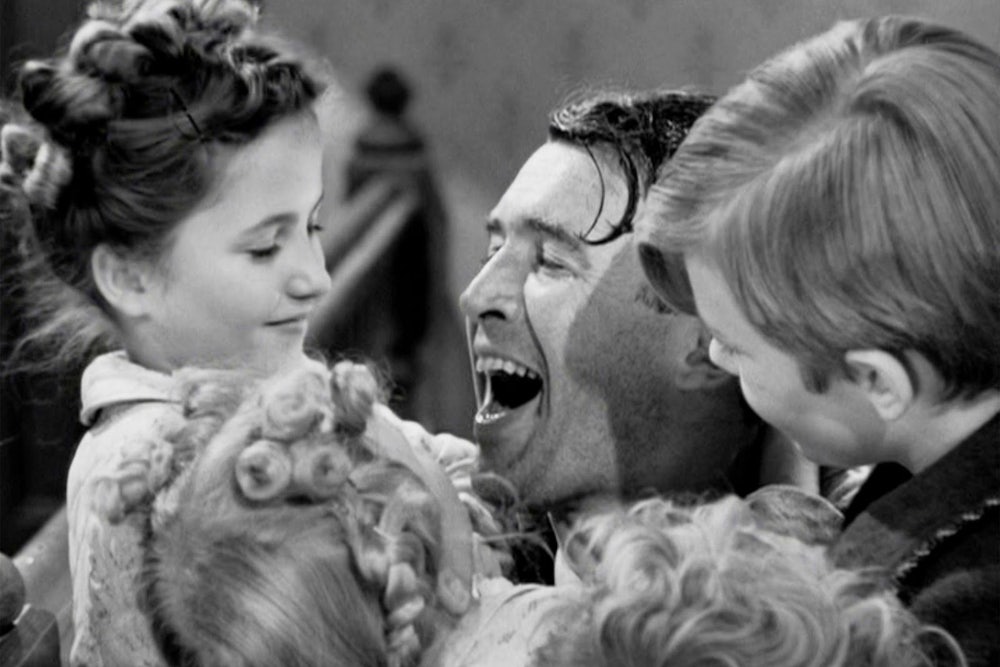Frank Capra, Hollywood’s Horatio Alger, lights with more cinematic know-how and zeal than any other director to convince movie audiences that American life is exactly like the Saturday Evening Post covers of Norman Rockwell. It’s a Wonderful Life, the latest example of Capracorn, shows his art at a hysterical pitch. Capra’s moralizing, which is driven home in films packed with absurdly over-simplified characterizations and unbearable whimsy, is presented with great talent almost wholly through visual detail. It has never been told so frantically as in this expression of how kind, innocent and happy the “little” people are on Main Street.
The postwar Jimmy Stewart looks a shade more mellow and works much harder at his acting, but he’s still stuck in It’s a Wonderful Life with his traditional character grown flat with usage—unassuming, a bit shy, sincere as a Boy Scout, a passionate spokesman for the little people. His George Bailey is a golden-hearted small-town businessman forever thwarted in doing big things by his ties to family and friends. Year after year he scrapes along in the small-town rut he hates, doing a good deed here and a better deed there, selling houses with his golden heart instead of his head.
One day Bedford Falls’s meanest man (Lionel Barrymore, who in other years at this time has played Scrooge) steals money for which George is responsible, and George, faced with disgrace, works himself up into a first-class tizzy. His character changes so drastically—he becomes a whimperer, a mean drunk, suicidal— that you wonder where this side of him has been hiding. It seems reasonable to suspect that Jo Swerling, who is credited with doing additional scenes, got in an additional character too. An angel (Henry Travers) comes down, cures Jimmy by showing him the good he did in Bedford Falls, and Jimmy goes home to find his friends have given him a laundry basket full of dollar bills. Admirers of this honest, hard-working, self-sacrificing character Stewart has played since he left Princeton are going to be uneasy when they see Jimmy’s face light up like a Christmas tree at getting all this free dough.
Capra is an old-time movie craftsman, the master of every trick in the bag, and in many ways he is more at home with the medium than any other Hollywood director. But all of his details give the impression of contrived effect.
To make his points he always takes an easy, simple-minded path that doesn’t give much credit to the intelligence of the audience. In characterizing the grasping, hateful banker he evades criticism by admitting indirectly that he is painting this hobgoblin with absurdly black strokes, but even a child would find this excuse unpalatable. Capra’s attempt to show the town as it would have been if George hadn’t been born leads to another hurried, unimaginative simplification. Main Street would be lined with dance halls; its citizens would be greedy and mean; there would be a Negro barrelhouse piano player in George’s favorite saloon; the people close to him would be in institutions, in the gutter, under the table, running flophouses. A regiment of good fairies couldn’t have worked the wonders in Bedford Falls that George did.
The few unsentimental moments here and there are usually contributed by Stewart. One of these is a scene on a railway platform in which he gets across the pain of his frustration. The charming moments—when he is courting Donna Reed—come off because of his soft-spoken, perfectly timed delivery. The most surprising performance is that of Miss Reed, for her self-possessed dignity and intelligence. There is an army of good supporting players like Frank Albertson, who get nowhere because they have to play such impossible parts.
